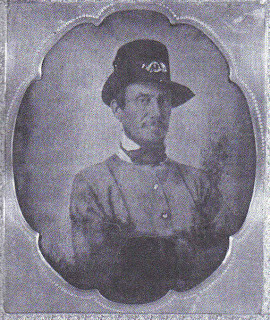Colonel John Robert Baylor
Born in Paris, Kentucky in 1822, John Robert Baylor moved to Texas at the age of 18. From that moment on, he considered himself a Texan. Prior to the Civil War, Baylor served in the Texas state legislature, published a Democratic magazine called The White Man, and worked as an Indian agent. He soon earned the reputation of being an Indian hater and fighter.
Robert P. Kelley
When the Civil War began, Baylor helped organize the 2nd Texas Mounted Rifles and he was elected the regiment's lieutenant colonel. In late 1861, Brigadier General Henry Hopkins Sibley promoted Baylor to colonel. A local newspaper editor named Robert P. Kelley accused Baylor of cowardice several times in his paper because Baylor had begged Richmond for reinforcements. On December 12, 1861, Baylor confronted Kelley on a street in Mesilla and shot him in the jaw and neck. Kelley was mortally wounded and died on New Years Day in 1862.
President Davis ordered Baylor to move his regiment into southern New Mexico (which was a territory at the time). There Baylor won a small battle at Mesilla against Union Major Isaac Lynde. He managed to capture 500 Federal soldiers with a force of just 300 men. He then made himself governor of the Arizona Territory.
Baylor's biggest concern wasn't the Federals in the area, but the local Indian tribes. The Indians there being the fearful Apache Indians. He disagreed with the governments policy of bribing Indians to keep the peace. He wrote, "The Indians make peace treaties to get blankets and presents. They never think of keeping a treaty longer than they see an opportunity to rob and murder some one."
Baylor like Federal General Sherman believed that the Indian race should be exterminated. He then went a step further by giving an order to his men stating, "Use all means to persuade the Apaches or any tribe to come in for the purpose of making peace, and when you get them together kill all the grown Indians and take the children prisoners and sell them to defray the expense of killing the adult Indians. Buy whiskey and such other goods as may be necessary for the Indians and I will order vouchers given to cover the amount expended. Leave nothing undone to insure success, and have a sufficient number of men around to allow no Indian to escape."
Davis heard of Baylor's order in late 1862 and was abhorred with the Texas colonel. Baylor attempted to defend himself, saying, "My policy is heartily supported by virtually everybody personally involved except, of course, the Indians." He believed that Jefferson Davis was out of touch with frontier realities. Davis of course revoked Baylor's commission.
Baylor managed to get elected to the Confederate Congress where he managed to become friends with Davis. He then was given another commission as colonel where he was to return to Texas and raise another regiment of cavalry. The war would end before he reached the Lone Star state.
Colonel George Wythe Baylor, Robert's brother
He practiced law following the war and was known for his hot temper and outbursts. His own brother George Wythe Baylor said, "Anyone he liked was the best fellow in the world, and anyone he disliked was the damnedest rascal living." He was involved in several duels following the war and ironically his brother George W. Baylor was the colonel who killed Confederate Major General John Austin Wharton in an argument. Wharton was unarmed at the time.
Grave of Baylor lists him as a general, a rank he never obtained
Surprisingly, he died at the age of 71 of natural causes and not of a bullet. He is buried in Montell, Texas. Baylor University is named after his uncle.

Pre-war Photo of John Robert Baylor heavily retouched






